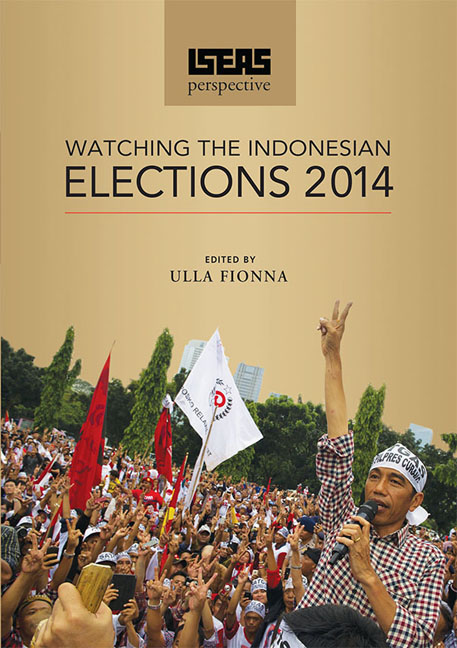Book contents
- Frontmatter
- Contents
- Foreword
- Introduction
- 1 The Gubernatorial Race in Jakarta: Background and Implications
- 2 Indonesian Parties Struggle for Electability
- 3 Who Will Be Indonesian President in 2014?
- 4 Indonesian Presidential Election Forcing Rejuvenation of Parties
- 5 Resisting Democracy: Front Pembela Islam and Indonesia's 2014 Elections
- 6 Getting to Know the Contestants of the 2014 Indonesian Parliamentary Elections
- 7 A Snapshot of the Campaigning in Indonesia's 2014 Legislative Elections
- 8 Unpacking the Results of the 2014 Indonesian Legislative Elections
- 9 Indonesia's 2014 Legislative Elections: The Dilemmas of “Elektabilitas” Politics
- 10 The Islamic Factor in the 2014 Indonesian Elections
- 11 Vote-buying in Indonesia's 2014 Elections: The Other Side of the Coin
- 12 Gap Narrows Between Candidates in Indonesian Presidential Elections
- 13 Analysing the Economic Platforms in the Indonesian Presidential Election
- 14 Indonesian Islamic Parties After the 2014 Elections: Divided and Self-Centred
- 15 Safeguarding Indonesia's Pluralism: An Essential Task for Joko Widodo
- 16 Jokowi's Key Economic Challenge: Improving Fiscal Policy for Equitable Growth
- 17 Crossing the River While Avoiding the Stones: Jokowi's Run-up to the Presidency
- 18 Post-elections Indonesia: Towards a Crisis of Government?
- Epilogue: Jokowi's First Months: Compromise Cabinet, Subsidy Cuts, and Corrupt Coalition
16 - Jokowi's Key Economic Challenge: Improving Fiscal Policy for Equitable Growth
Published online by Cambridge University Press: 29 July 2017
- Frontmatter
- Contents
- Foreword
- Introduction
- 1 The Gubernatorial Race in Jakarta: Background and Implications
- 2 Indonesian Parties Struggle for Electability
- 3 Who Will Be Indonesian President in 2014?
- 4 Indonesian Presidential Election Forcing Rejuvenation of Parties
- 5 Resisting Democracy: Front Pembela Islam and Indonesia's 2014 Elections
- 6 Getting to Know the Contestants of the 2014 Indonesian Parliamentary Elections
- 7 A Snapshot of the Campaigning in Indonesia's 2014 Legislative Elections
- 8 Unpacking the Results of the 2014 Indonesian Legislative Elections
- 9 Indonesia's 2014 Legislative Elections: The Dilemmas of “Elektabilitas” Politics
- 10 The Islamic Factor in the 2014 Indonesian Elections
- 11 Vote-buying in Indonesia's 2014 Elections: The Other Side of the Coin
- 12 Gap Narrows Between Candidates in Indonesian Presidential Elections
- 13 Analysing the Economic Platforms in the Indonesian Presidential Election
- 14 Indonesian Islamic Parties After the 2014 Elections: Divided and Self-Centred
- 15 Safeguarding Indonesia's Pluralism: An Essential Task for Joko Widodo
- 16 Jokowi's Key Economic Challenge: Improving Fiscal Policy for Equitable Growth
- 17 Crossing the River While Avoiding the Stones: Jokowi's Run-up to the Presidency
- 18 Post-elections Indonesia: Towards a Crisis of Government?
- Epilogue: Jokowi's First Months: Compromise Cabinet, Subsidy Cuts, and Corrupt Coalition
Summary
INTRODUCTION
Now that he has won the election, Indonesian President-elect Joko “Jokowi” Widodo has only three months in which to prepare and consolidate his actionable economic platform before his inauguration day in October. There remain significant economic challenges awaiting him. Expectations are great that he will lead the country to become a great nation, in a style similar to his political coalition's name, Koalisi Indonesia Hebat (the great Indonesia coalition). He will however need to be realistic in identifying his priorities within his five-year term. Not only will he need to select well the cabinet ministers who will work with him in fulfiling his campaign promises but he will also have to find the money needed to implement many of his development programmes.
Against this backdrop, this essay discusses the fiscal challenges faced by the new government, and argues that improving future fiscal policy is crucial to the achievement of more equitable growth.
THE POLITICAL ECONOMY OF FISCAL SPACE
A key challenge facing Jokowi will be fiscal space. This refers to the availability of government revenues for developmental expenditures. Jokowi will inherit little fiscal space for his own development programmes due to President Susilo Bambang Yudhoyono's (SBY) populist policy on energy subsidies. Between 2009 and 2014, the share of energy subsidies to the total central government spending increased significantly from 7.6 per cent to about 27.4 per cent. In 2014, Indonesia spent about US$33 billion on fuel and electricity subsidies, and ironically, these primarily benefitted the midde class and have long been criticized for being poorly targeted and detrimental to Indonesia's goal to achieve energy security. Worse still, the amount allocated for energy subsidies is higher than central government spending on education, healthcare and social protection programmes. During SBY's second term, energy subsidies grew much higher than central government revenues did. As a result, Indonesia's budget deficit increased from 1.6 per cent of GDP in 2009 to 2.4 per cent of GDP in 2014.
Jokowi is fully aware that the fiscal situation will be critical to his own plans. In his campaign, he promised to develop the country's infrastructure, boost productivity in the agriculture and manufacturing sectors, improve human capital, and provide better healthcare, education and social protection for Indonesians.
- Type
- Chapter
- Information
- ISEAS PerspectiveWatching the Indonesian Elections 2014, pp. 147 - 157Publisher: ISEAS–Yusof Ishak InstitutePrint publication year: 2015



